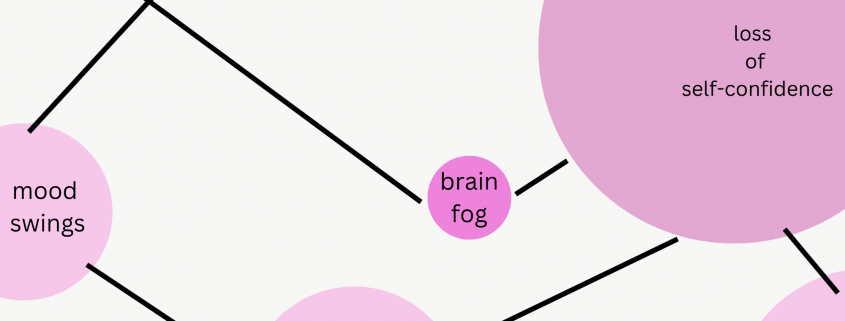Connect The Dots
What should you expect in perimenopause?
Expect the unexpected. And connect the dots.
In perimenopause (the years leading up to menopause) your ovaries start showing signs of aging (they age faster than you do!) and do not perform as predictably and regularly as they used to.
In perimenopause things start to change.
Many say perimenopause is puberty in reverse. In puberty you learned to live with sex hormones like estrogen (the predominant female sex hormone) and progesterone as your ovaries matured. In perimenopause these hormones are fluctuating again and declining.
Because estrogen acts in so many tissues and organs in the body it’s common to experience many changes during perimenopause which can last 3-6 years or even longer for some.
It’s OK not to feel any changes other than the end of period.
6 in 10 women tend to experience several changes (aka symptoms).
2 in 10 experience severe and debilitating changes that can turn their lives upside down.
Most people know about hot flashes but most are not aware that sleep difficulties, brain fog, anxiety, mood swings, depression, anger, and loss of self-confidence can also be part of the perimenopause experience.
Changes can be physical, cognitive, and emotional. And as with many other changes in life, it may be hard to accept and to go through. But being prepared will make it easier and should reduce the accompanying fear and worry.
Menopause isn’t new but now women are working right through it. And it can be downright difficult to cope with. Add to that the fact that menopause is
- overlooked by our healthcare system
- overlooked by our workplaces
- is a big taboo that no one talks about.
No wonder the majority of women feel isolated and think they are the only one.
You may be feeling alone but you’re not the only one.
I don’t mean to scare you with a long list of challenges. In fact, you probably won’t experience all these symptoms—definitely not all at the same time—and because perimenopause is a journey, your experience may change with time. And things do get BETTER in postmenopause when hormone levels stabilize.
My main goal is to help you connect the dots and empower you to be your own health advocate.
When you go to the physician and your complaints are dismissed, or you get a diagnosis that doesn’t sit right with you (depression and anxiety are common examples), I want you to connect the dots – think about all the things you’re experiencing and feeling. Being aware and connecting these experiences will help you see that what you’re going through is probably related to the hormonal changes of midlife.
Because, contrary to what you may have been told by a doctor—that this is just part of life and therefore you must put up with it—even though menopause is unavoidable, suffering is an option.
There are myriad options to improve your symptoms, make your journey easier, and help you feel like yourself again and enjoy a vibrant and productive life.



 MenopausED
MenopausED